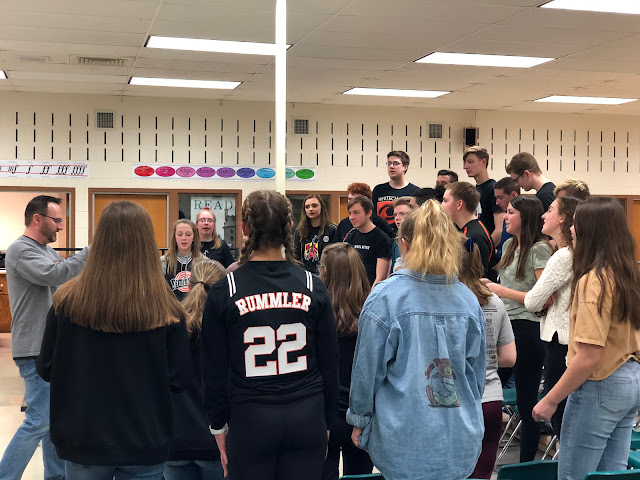KARCHER STAFF BLOG
2019-2020 Karcher Calendar
Facebook Page: https://www.facebook.com/KarcherMiddleSchool/
BASD Staff Blog: https://basdstaffnews.blogspot.com/
2019-2020 Karcher Calendar
Facebook Page: https://www.facebook.com/KarcherMiddleSchool/
BASD Staff Blog: https://basdstaffnews.blogspot.com/
______________________________________________________________________________
Kudos
_____________________________________________________________________________________________________
- Kudos to Brad Ferstenou and Stephanie Rummler for your organization and time to make snow cones happen during the lunch period for our students! What a great way for students to use their KCBs!!!
- Thank you to our teachers for your time and efforts to infuse the Standards Mastery within iReady and the TDAs into our work between now and April! Such a collaborative group!
- Thank you all as well for your patience, time, and strategies for getting the iReady winter diagnostic completed! With so many students out sick the window has been extended for this entire week to help get students finished!
Article this week: This article really speaks to our purpose and goals when it comes to our Essential Skill work. We are not a standards-based school district as we believe it is important to merge standards together that make sense together in order to really hone in on what is important for all students! This article speaks to this along with the ever so importance of disciplinary literacy, something I know all of you believe in and infuse everyday!
______________________________________________________________________________Radical Reset: The Case for Minimalist Literacy Standards
Pared down standards are the cure to the Common Core.
In profound ways, literacy is destiny. It is the single most important goal of schooling and the key to academic and career success. Adequate levels of literacy would nearly eliminate the achievement gap (Hirsch, 2010); inadequate levels account, more than anything, for high school and college dropout rates as well as, according to some, our perversely high rates of special education placement (Ferrandino & Tirozzi, 2004).
Quantity Counts
It all begins with reading—lots of it. David Liben writes that students must consume "a huge volume and range of texts," including grade-appropriate texts (Pondiscio & Mahnken, 2014). For Kelly Gallagher, struggling readers must "read voraciously" to catch up with their peers (2009). Richard Allington's research likewise demonstrates that students must read "huge amounts" of text to acquire essential vocabulary and become proficient readers (2006).
To that end, Allington recommends two unassailable literacy standards, which could almost suffice on their own: a minimum of 60 minutes of reading and 40 minutes of writing every day, across the curriculum (2011). Large amounts of reading can pay off instantly—even a few weeks of reading-intensive literacy instruction will result in about one full year of academic growth (Haycock, 2005).
And yet students today read, discuss, and write about what they read for an infinitesimal proportion of the school day (Sundeen, 2015). Instead, they engage in dismaying amounts of aimless group activities; of cutting, coloring, pasting; or of completing reams of worksheets. Moreover, the quality and complexity of reading assignments has plummeted by several grade levels in the last 30 years (Paulson, 2014). These may be the two most destructive, underappreciated facts in all of education today.
Essential Literacy Standards
To address these issues, individual schools or districts should develop a viable set of simple, high-leverage standards—which specify, schedule, or enumerate the approximate number, amount, length, and frequency of the following, appropriate to each grade level:
Anchor Texts: The knowledge-rich, grade-appropriate fiction and non-fiction books, articles, textbook selections, poems, plays, and primary resources that all students will read—and analyze, discuss, and write about—in each respective course.
Discussions, Seminars, and Debates: These must be purposeful, grounded in reading, and aligned with simple criteria—for example, speak audibly, clearly, logically, and with civility (see Schmoker, 2018a, pp. 140–141).
Writing Assignments and Papers: To be completed each week, grading period, or year—and predominantly grounded in close, analytic reading. Smart districts build formal, extended capstone writing assignments into the curriculum for certain grade levels (such as 5th, 8th, and 12th) (Schmoker, 2018a). And they employ common rubrics and "exemplars" of effective student writing to maintain quality standards (which include the requirement for proper grammar, punctuation, and sentence structure).
Less Really Is More
Some might ask: Are such minimal standards enough? Recent research and successful schools indicate that they are, that less is more—and that long lists of criteria are actually inimical to high performance.
Marcus Buckingham's research (2005) on organizational management, in particular, demonstrates the power of minimalist performance standards and criteria. If we want people to perform well, concision is king: the fewer the criteria, the easier it is to reinforce, practice, monitor—and thus ensure—that those criteria are fully met. When organizations establish only a tiny set of crystal-clear criteria, both performance—and job satisfaction—skyrocket.
The same goes for schools. There are both historic and contemporary precedents for minimalist literacy standards which would ensure that students read and write in larger—much larger—amounts. As Diane Ravitch (2010) points out, the operative "standards" (her word) embedded in the 1901 college entrance exam required students to read 10 entire substantial books during their senior year (the list was revised annually), and then be ready to write an extended, high-quality essay about any or all of them. The essays were scored with a common scoring guide. Such standards would almost guarantee a transformative shift from worksheets and skill drills to large amounts of analytic reading, writing, and writing instruction.
In a similar way, so would the "Standards for Success" developed by David Conley and his team at the University of Oregon.
In 2005, Conley and his colleagues published a landmark study of college and postsecondary readiness. They found that K–12 schools typically require a highly variant—and grossly inadequate—number of reading and writing assignments. On the basis of their findings, they proposed that schools and districts establish standards for the following, and for every course—in order to guarantee generous amounts of reading and writing:
- The minimum number of common, core texts to be read.
- The minimum number of pages students would read.
- The minimum number—and length—of writing assignments to be written in each course.
In addition, they proposed that departments should implement common scoring guides for the written work.
As we've seen, quantity counts—immensely. Such simple standards, grounded in content knowledge, would redress our decades-long failure to ensure that students engage in large—and life-changing—amounts of authentic literacy activities. Done right, they could transform education in America, as many schools attest.
Our work is the right work!
Information/Reminders
__________________________________________________________________________________________________________________________
New Construction Information
- Click HERE to access the building blog. It has been updated as of January 30th!
This week:
- Monday, February 3 - 7th grade to the auditorium during extended advisory!
- Please bring them up as soon as you finish announcements and attendance and then stay up stairs with your advisory.
- All of the course selection materials are in your mailbox if you have not grabbed them yet!
- Please oversee the collection of your advisory student's elective course request sheets and put them back in the envelope as you receive them back from students. There is also an advisory class list so please check them off as you get them back. It will help us know who we still need to get course request sheets from as we near the entering them in Skyward time frame!
- Forms are due back to you by February 10th!!! At the end of the day on the 10th or the morning of the 11th, please bring your envelope up to Kris Thomsen!
- Monday, February 3 - BLT Meeting in the large conference room from 2:40 - 3:30.
- Focus: Standards Mastery/TDA report out for your team, parent/teacher conferences for February, and standards-based gradebook. If there is anything you want BLT to talk about tomorrow please add it to the BLT document that is clickable in the Karcher Calendar on February 3.
- Monday, February 3 - Freshmen Open House at BHS from 5:30-7:25. Please encourage our 8th grade students to attend! Skyward emails have reminded them of the information along with Facebook.
- Tuesday, February 4 - Strings Concert in our Karcher gym starting at 6:30! Come listen to how beautiful our orchestra students are with Dustan Eckmann and Liz Deger!
- Wednesday, February 5 - PLC in the library!
- You will all have this time to plan for your use of the TDAs and/or Standards Mastery infusion into your classes and/or iTime.
- Friday, February 7 - SNOCO Dance for all of our students in our library/Ulab/large conference room from 6:30 - 8:30pm.
Looking ahead:
- Monday, February 10 - 7th grade course selection sheets are due to their advisory teacher! Then bring them up to Kris.
- Monday, February 10 - Focus on parent/teacher conferences for February 25th from 6:00-8:00pm. This will be where we invite the parents that we would like to talk with as a team or individual teacher.
Something to know:
As a district we set up the same type of process we had with Richters but now with Pick n' Save. Below is the information/steps when using the card!
We have opened a Pick N Save corporate credit card account. Each of school will receive a card and each school has an individual card number.
We can begin utilizing it Monday, February 3rd.
We have opened a Pick N Save corporate credit card account. Each of school will receive a card and each school has an individual card number.
We can begin utilizing it Monday, February 3rd.
- All purchases require a signature on the receipt kept by the store.
- Utilizing U-Scan/Self Checkout is not permissible.
- The staff member using the card will need to notify the cashier, at every transaction, that we are tax exempt. (Even though our tax exempt number is printed on the front of the card.)
- The staff member who uses the card must return all receipts to Kim when they are returning the card, which should be done as soon as they have completed their purchase.
- Pick N Save will charge us a $5.00 fee per a receipt copy request, so whomever it is that made the purchase and has lost the receipt, will be held responsible for the $5.00 cost.
- If this becomes repetitive, the card will no longer be available to that staff member.
______________________________________________________________________________
Pictures from the week
_____________________________________________________________________________________________________
7th grade worm dissection!













